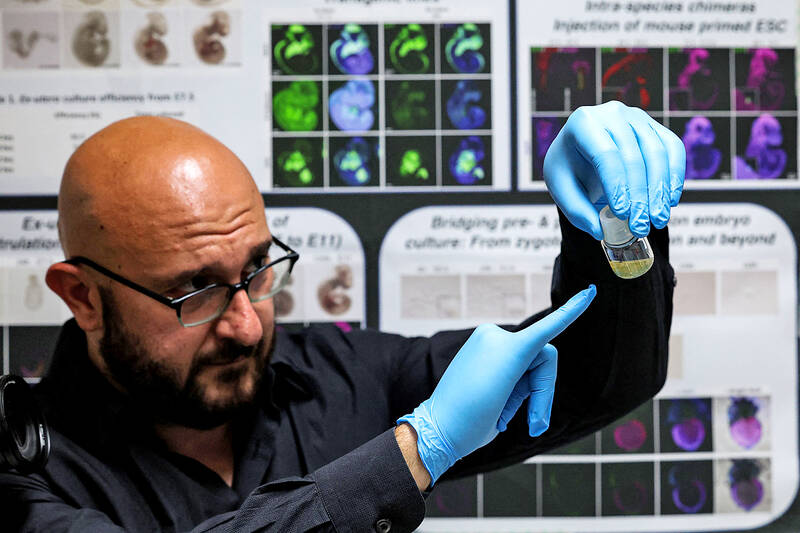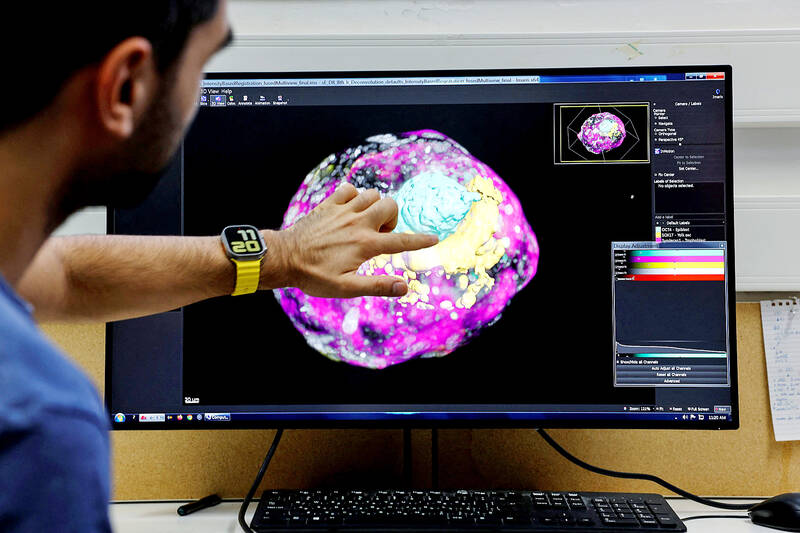Scientists have developed human embryo-like structures without using sperm, an ovum or fertilization, offering hope for research on miscarriage and birth defects, but also raising fresh ethical concerns.
Earlier this year, several labs around the world released pre-print studies, meaning they had not been peer-reviewed, describing their development of early human embryo-like structures.
However, one group’s research has now been published in the peer-reviewed journal Nature, describing how researchers coaxed human embryonic stem cells to self-organize into a model resembling an early embryo.

Photo: AFP
The research was welcomed by some scientists as an “impressive” advance that could help unlock secrets about the precarious early stages of pregnancies, when failure is most common.
However, the work is likely to renew debate on the need for clearer ethical rules on development of lab-grown human embryo models.
The researchers, led by Palestinian scientist Jacob Hanna at the Weizmann Institute in Israel, harnessed the power of embryonic stem cells, which can become any kind of cell.

Photo: Reuters
They produced embryo models up to 14 days old, which is the legal limit for human embryo lab research in many countries, and the point at which organs like the brain begin to develop.
The researchers said their work differs from those of other teams, because it uses chemically rather than genetically modified embryonic stem cells and produces models more like real human embryos, complete with yolk sac and amniotic cavity.
These similarities could make the models more useful for research into conditions such as miscarriage, birth defects and infertility, said James Briscoe of Britain’s Francis Crick Institute.
The model “seems to produce all of the different types of cells that form tissues at this early stage of development,” said Briscoe, principal group leader and associate research director at the biomedical research charity.
The research “is a step towards opening a window on the period of human development, where many pregnancies fail and which has been really difficult to study up until now,” he said.
Both the researchers and scientists not involved in the work said that the models should not be considered human embryos.
The structure “highly resembles, but [is] not identical, to the in utero situation,” the research says.
The success rate on generating the models was also low, with the stem cells organizing correctly just a small percentage of the time.
Still, “in contrast to similar studies published earlier this year, these embryo-like structures contained most of the cell types found in developing embryos,” said Darius Widera, an expert in stem cell biology at the University of Reading in England.
The research and other recent work show “that models of human embryos are getting more sophisticated and closer to events that occur during normal development.”
That highlights “that a robust regulatory framework is more needed than ever before,” he added.
In Britain, Cambridge University has begun developing the kingdom’s first governance framework for stem cell-based human embryo models.
British law prohibits the culturing of human embryos in labs beyond the 14-day mark, but because the structures derived from stem cells are formed artificially, they are not explicitly covered by existing regulations.
Still, most researchers have adopted voluntary limits on their work at this stage.
The Weizmann Institute research did not develop its models beyond 14 days and does not involve transferring the models into a human or animal womb.

NATIONAL SECURITY THREAT: An official said that Guan Guan’s comments had gone beyond the threshold of free speech, as she advocated for the destruction of the ROC China-born media influencer Guan Guan’s (關關) residency permit has been revoked for repeatedly posting pro-China content that threatens national security, the National Immigration Agency said yesterday. Guan Guan has said many controversial things in her videos posted to Douyin (抖音), including “the red flag will soon be painted all over Taiwan” and “Taiwan is an inseparable part of China,” while expressing hope for expedited “reunification.” The agency received multiple reports alleging that Guan Guan had advocated for armed reunification last year. After investigating, the agency last month issued a notice requiring her to appear and account for her actions. Guan Guan appeared as required,

A strong cold air mass is expected to arrive tonight, bringing a change in weather and a drop in temperature, the Central Weather Administration (CWA) said. The coldest time would be early on Thursday morning, with temperatures in some areas dipping as low as 8°C, it said. Daytime highs yesterday were 22°C to 24°C in northern and eastern Taiwan, and about 25°C to 28°C in the central and southern regions, it said. However, nighttime lows would dip to about 15°C to 16°C in central and northern Taiwan as well as the northeast, and 17°C to 19°C elsewhere, it said. Tropical Storm Nokaen, currently

‘NATO-PLUS’: ‘Our strategic partners in the Indo-Pacific are facing increasing aggression by the Chinese Communist Party,’ US Representative Rob Wittman said The US House of Representatives on Monday released its version of the Consolidated Appropriations Act, which includes US$1.15 billion to support security cooperation with Taiwan. The omnibus act, covering US$1.2 trillion of spending, allocates US$1 billion for the Taiwan Security Cooperation Initiative, as well as US$150 million for the replacement of defense articles and reimbursement of defense services provided to Taiwan. The fund allocations were based on the US National Defense Authorization Act for fiscal 2026 that was passed by the US Congress last month and authorized up to US$1 billion to the US Defense Security Cooperation Agency in support of the

PAPERS, PLEASE: The gang exploited the high value of the passports, selling them at inflated prices to Chinese buyers, who would treat them as ‘invisibility cloaks’ The Yilan District Court has handed four members of a syndicate prison terms ranging from one year and two months to two years and two months for their involvement in a scheme to purchase Taiwanese passports and resell them abroad at a massive markup. A Chinese human smuggling syndicate purchased Taiwanese passports through local criminal networks, exploiting the passports’ visa-free travel privileges to turn a profit of more than 20 times the original price, the court said. Such criminal organizations enable people to impersonate Taiwanese when entering and exiting Taiwan and other countries, undermining social order and the credibility of the nation’s